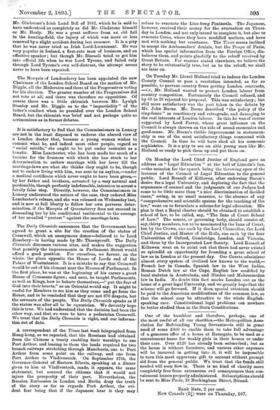On Monday the Lord Chief Justice of England gave an
address on " Legal Education " at the hall of Lincoln's Inn, —the occasion for the speech being the throwing open of the lectures of the Council of Legal Education to the general public. Lord Russell of Killowen, after endorsing Bacon's desire for a legal University, and deploring the fact that the arguments of counsel and the judgments of our Judges had come to be little more than " a nice discrimination of decided cases," owing, in no small measure, to the absence of any "comprehensive and scientific system for the teaching of the law," went on to formulate a scheme for legal education. His plan is that a Royal charter should be obtained to establish a school of law, to be called, say, " The Inns of Court School of Law." The senate, or governing body, should consist of, say, thirty members, ten to be nominated by the Inns of Court, ten by the Crown, one each by the Lord Chancellor, the Lord Chief Justice, and Master of the Rolls, one each by the four Universities of Oxford, Cambridge, London, and Victoria, and three by the Incorporated Law Society. Lord Russell of Killowen went on to point out that there had never existed so splendid an opportunity for founding a great school of law as in London at the present day. Our Courts administer almost every system of civilised law known to the world,— French law in Canada, Spanish law in the West Indies, Roman Dutch law at the Cape, English law modified by local statutes in Australasia, and Hindoo and Mahommedan law in India. No doubt this fact marks London out as the home of a great legal University, and we greatly hope that the scheme will go forward. If it does, special attention should be paid to the American modifications of the common law, so that the school may be attractive to the whole English- speaking race. Constitutional legal problems can nowhere be better studied than in the State Constitutions.


















































 Previous page
Previous page